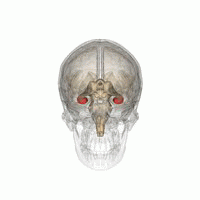Working memory is a cognitive system with a limited capacity that can hold information temporarily. It is important for reasoning and the guidance of decision-making and behavior. Working memory is often used synonymously with short-term memory, but some theorists consider the two forms of memory distinct, assuming that working memory allows for the manipulation of stored information, whereas short-term memory only refers to the short-term storage of information. Working memory is a theoretical concept central to cognitive psychology, neuropsychology, and neuroscience.

Attention deficit hyperactivity disorder (ADHD) is a neurodevelopmental disorder characterised by executive dysfunction occasioning symptoms of inattention, hyperactivity, impulsivity and emotional dysregulation that are excessive and pervasive, impairing in multiple contexts, and otherwise age-inappropriate.

Methylphenidate, sold under the brand names Ritalin and Concerta among others, is a central nervous system (CNS) stimulant used medically to treat attention deficit hyperactivity disorder (ADHD) and, to a lesser extent, narcolepsy. It is a primary medication for ADHD ; it may be taken by mouth or applied to the skin, and different formulations have varying durations of effect, commonly ranging from 2–4 hours. For ADHD, the effectiveness of methylphenidate is comparable to atomoxetine but modestly lower than amphetamines.

Neurofeedback is a form of biofeedback that uses electrical potentials in the brain to reinforce desired brain states through operant conditioning. This process is non-invasive and typically collects brain activity data using electroencephalography (EEG). Several neurofeedback protocols exist, with potential additional benefit from use of quantitative electroencephalography (QEEG) or functional magnetic resonance imaging (fMRI) to localize and personalize treatment. Related technologies include functional near-infrared spectroscopy-mediated (fNIRS) neurofeedback, hemoencephalography biofeedback (HEG), and fMRI biofeedback.

Nootropics, colloquially brain supplements, smart drugs and cognitive enhancers, are natural, semisynthetic or synthetic compounds which purportedly improve cognitive functions, such as executive functions, attention or memory.

Dopamine receptors are a class of G protein-coupled receptors that are prominent in the vertebrate central nervous system (CNS). Dopamine receptors activate different effectors through not only G-protein coupling, but also signaling through different protein interactions. The neurotransmitter dopamine is the primary endogenous ligand for dopamine receptors.

In cognitive science and neuropsychology, executive functions are a set of cognitive processes that are necessary for the cognitive control of behavior: selecting and successfully monitoring behaviors that facilitate the attainment of chosen goals. Executive functions include basic cognitive processes such as attentional control, cognitive inhibition, inhibitory control, working memory, and cognitive flexibility. Higher-order executive functions require the simultaneous use of multiple basic executive functions and include planning and fluid intelligence.
Brain training is a program of regular activities purported to maintain or improve one's cognitive abilities. The phrase “cognitive ability” usually refers to components of fluid intelligence such as executive function and working memory. Cognitive training reflects a hypothesis that cognitive abilities can be maintained or improved by exercising the brain, analogous to the way physical fitness is improved by exercising the body. Cognitive training activities can take place in numerous modalities such as cardiovascular fitness training, playing online games or completing cognitive tasks in alignment with a training regimen, playing video games that require visuospatial reasoning, and engaging in novel activities such as dance, art, and music.

Lisdexamfetamine, most commonly sold under the brand name Vyvanse and Elvanse among others, is a stimulant medication that is used to treat attention deficit hyperactivity disorder (ADHD) in children and adults and for moderate-to-severe binge eating disorder in adults. Lisdexamfetamine is taken by mouth. Its effects generally begin within two hours and last for up to 14 hours. In the United Kingdom, it is usually less preferred to methylphenidate for the treatment of children.
Attention deficit hyperactivity disorder management options are evidence-based practices with established treatment efficacy for ADHD.
The n-back task is a continuous performance task that is commonly used as an assessment in psychology and cognitive neuroscience to measure a part of working memory and working memory capacity. The n-back was introduced by Wayne Kirchner in 1958. N-Back games are purported to be a training method to improve working memory and working memory capacity and also increase fluid intelligence, although evidence for such effects are lacking.
In psychology and neuroscience, executive dysfunction, or executive function deficit, is a disruption to the efficacy of the executive functions, which is a group of cognitive processes that regulate, control, and manage other cognitive processes. Executive dysfunction can refer to both neurocognitive deficits and behavioural symptoms. It is implicated in numerous psychopathologies and mental disorders, as well as short-term and long-term changes in non-clinical executive control. Executive dysfunction is the mechanism underlying ADHD Paralysis, and in a broader context, it can encompass other cognitive difficulties like planning, organizing, initiating tasks and regulating emotions. It is a core characteristic of ADHD and can elucidate numerous other recognized symptoms.
Working memory training is intended to improve a person's working memory. Working memory is a central intellectual faculty, linked to IQ, ageing, and mental health. It has been claimed that working memory training programs are effective means, both for treating specific medical conditions associated with working memory deficit, as and for general increase in cognitive capacity among healthy neurotypical adults.

Inhibitory control, also known as response inhibition, is a cognitive process – and, more specifically, an executive function – that permits an individual to inhibit their impulses and natural, habitual, or dominant behavioral responses to stimuli in order to select a more appropriate behavior that is consistent with completing their goals. Self-control is an important aspect of inhibitory control. For example, successfully suppressing the natural behavioral response to eat cake when one is craving it while dieting requires the use of inhibitory control.

Memory improvement is the act of enhancing one's memory. Research on improving memory is driven by amnesia, age-related memory loss, and people’s desire to enhance their memory. Research involved in memory improvement has also worked to determine what factors influence memory and cognition. There are many different techniques to improve memory some of which include cognitive training, psychopharmacology, diet, stress management, and exercise. Each technique can improve memory in different ways.

Attentional control, colloquially referred to as concentration, refers to an individual's capacity to choose what they pay attention to and what they ignore. It is also known as endogenous attention or executive attention. In lay terms, attentional control can be described as an individual's ability to concentrate. Primarily mediated by the frontal areas of the brain including the anterior cingulate cortex, attentional control is thought to be closely related to other executive functions such as working memory.

The neurobiological effects of physical exercise involve possible interrelated effects on brain structure, brain function, and cognition. Research in humans has demonstrated that consistent aerobic exercise may induce improvements in certain cognitive functions, neuroplasticity and behavioral plasticity; some of these long-term effects may include increased neuron growth, increased neurological activity, improved stress coping, enhanced cognitive control of behavior, improved declarative, spatial, and working memory, and structural and functional improvements in brain structures and pathways associated with cognitive control and memory. The effects of exercise on cognition may affect academic performance in children and college students, improve adult productivity, preserve cognitive function in old age, preventing or treating certain neurological disorders, and improving overall quality of life.
Cognitive behavioral training (CBTraining), sometimes referred to as structured cognitive behavioral training, (SCBT) is an organized process that uses systematic, highly-structured tasks designed to improve cognitive functions. Functions such as working memory, decision making, and attention are thought to inform whether a person defaults to an impulsive behavior or a premeditated behavior. The aim of CBTraining is to affect a person's decision-making process and cause them to choose the premeditated behavior over the impulsive behavior in their everyday life. Through scheduled trainings that may be up to a few hours long and may be weekly or daily over a specific set of time, the goal of CBTraining is to show that focusing on repetitive, increasingly difficult cognitive tasks can transfer those skills to other cognitive processes in your brain, leading to behavioral change. There has been a recent resurgence of interest in this field with the invention of new technologies and a greater understanding of cognition in general.
Torkel Klingberg is a professor of cognitive neuroscience at the Karolinska Institutet in Stockholm, Sweden. He is the author of two books in Swedish, translated into English by Neil Betteridge, namely The Overflowing Brain: Information Overload and the Limits of Working Memory and The Learning Brain: Memory and Brain Development in Children. His research testing the hypothesis that playing memory games such as N-back also improves broader skills is controversial. He was one of the founders of Cogmed, but has currently no financial relationships with the company. He is executive director of Cognition Matters, a project that provides free digital cognitive training tools for children worldwide.
NeuroNation and its associated medical app NeuroNation MED are cognitive training software applications developed by the German healthcare technology company Synaptikon GmbH. NeuroNation was launched in 2011.










